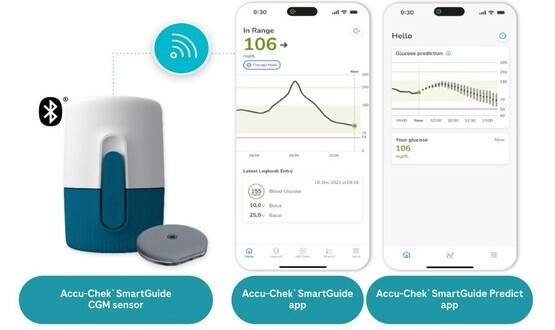West of England begins pilot to help people with diabetes
- 27 June 2016

A suite of mobile technologies is to be rolled out to 12,000 people with diabetes in the West of England later this year, as part of a two-year trial to help patients manage their condition more effectively.
The trial, the Diabetes Digital Coach Test Bed, is a collaboration between 12 partners, led by the West of England Academic Health Science Network. The project will provide people with both type 1 and type 2 diabetes with wearable technologies and smartphone apps, and will include elements of monitoring and coaching.
Diabetes Digital Coach is one of seven test beds announced by NHS England in January. The test beds bring together health organisations, technology companies, universities and charities to investigate whether particular technologies, used in combination, can both reduce the pressure on NHS services and improve the quality of patients’ lives. Diabetes Digital Coach is one of two test beds funded by the IoTUK, a three-year government programme designed to increase adoption of the Internet of Things technologies.
“A lot of the costs related to diabetes are around the different complications that typically come in after the 10-year stage,“ said Liz Dymond, deputy director of enterprise at the West of England AHSN. “The project is about keeping people fitter for longer so they can carry out their life in the way they want to.” She hopes that the model, if successful, “could be applied to people with other long-term conditions like cardiovascular disease or chronic obstructive pulmonary disease”.
Some of the participants will be recruited through health practitioners, but there are also plans to approach the public directly. People with diabetes had already been involved in identifying the kinds of technologies they might find helpful, Dymond said.
Participants will test wearable technologies to measure activity and heart rate, as well as devices that measure blood pressure, weight, HbA1c (which gives an indication of blood sugar levels) and cholesterol. A Bluetooth connection to a smartphone will then enable data to be transmitted to the Internet of Things platform via 3G.
Apps will be available to help participants manage their condition. These include Oviva, which offers face-to-face coaching from a dietitian through a smartphone or tablet, and SocialDiabetes, which uses information about an individual’s behaviour, diet and activity to predict how much insulin they need, making sure they get the right dose at the right time.
“We will provide real-time feedback to people with diabetes, and then it will be up to that person to say if they wish to share it with the healthcare professional, with a friend, or with their peers, which will help some of their motivation,” said Dymond. “We’re looking at the role that social networks can play in helping people keep on track and manage their health in the best way possible.”
Tom Dawson, managing director of Rescon, one of the technology partners, said that a lot of thought had gone into designing technologies that could motivate people: “When you've got someone with diabetes who doesn’t want to exercise, doesn’t want to eat healthily, it’s about how you help that person get to the point where they do want to do that, how you can use the technology and the information to make it engaging and desirable.”
HEOR and ROutcomes will carry out a formal health economics evaluation, based on data collected before and after the trial. Participants will also be interviewed about how helpful they found the tools and how they feel about managing their own condition.
As well as the WEAHSN, whose members include local clinical commissioning groups and NHS trusts, the partners are the Corsham Institute, Diabetes UK, Hewlett Packard Enterprise, Ki Performance, LeLan Solutions with SocialDiabetes, Mapmyhealth, Oviva, Rescon, ROutcomes, Soupdragon Resources and HEOR.



